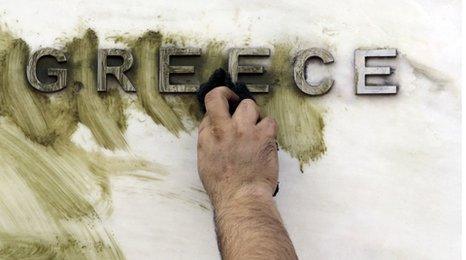How does Europe affect people's lives in the UK?
- Published
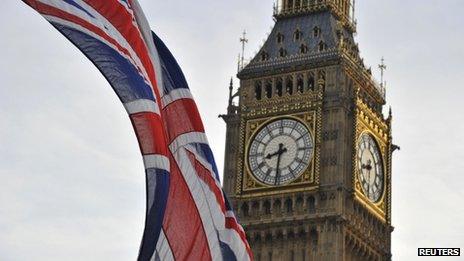
The Prime Minister is in Brussels, debating with other leaders about the future of the European budget.
Politicians are looking at a proposal of 908bn euro (£774bn) for 2014-2020, which is 5bn euros less than an earlier suggestion.
David Cameron has said that "there won't be a deal" unless even more cuts are made.
He, along with Germany, the Netherlands and Sweden, wants a lower budget.
Other countries like France say that having more money in Europe is beneficial.
In November, EU leaders failed to reach agreement as opinion was divided over cuts.
But how does Europe affect people's lives in the UK and what power does it have over our lives?
Key European Union policy areas
The United Kingdom is a member of the European Union but isn't part of the single currency, the euro.
Free trade - The EU is a trade bloc which means there are no quotas or tariffs for companies exporting goods and services within the EU.
European officials say the European legislation is meant to make it easier for UK businesses to trade across the EU's 27 states.
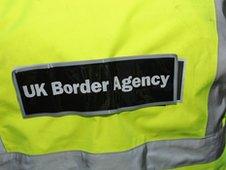
There are still border controls in the UK, unlike in most parts of the EU
Common commercial policy - these are rules put in place to protect EU businesses using things like tariffs, subsides and quotas on imports from outside the eurozone.
Those are essentially extra payments or restrictions.
EU competition law - this means that if you have a company you should have the opportunity to do business across the EU.
The law is designed to stop bigger firms abusing their power by setting up cartels and monopolies.
The internal market - the single market means UK citizens are free to move, live, study and trade anywhere within the EU.
This also affects you when you go on holiday within the European Union because there are no customs limits.
There are also no border controls across most of the EU either - the UK is one exception to that rule.
Other EU policy areas
Trans-European networks - many areas of Europe have benefited from this policy with new roads and transport networks designed to make it easier for the different countries to transport goods and services across the EU.
Energy - this is a common policy for European energy needs and proposals for making energy greener.
It also means when you sell or rent a property you have to provide a home energy performance rating chart such as an energy efficiency rating.
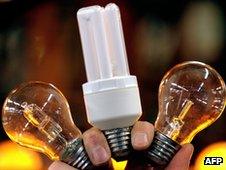
Light bulbs across the EU now have to be energy-efficient and have ratings
EU energy labels have also been introduced on all electrical goods like washing machines and even light bulbs to try to make us all more aware of what energy we're using.
Area of freedom, security and justice - this is designed to make it easier for police across the EU to cooperate but also to ensure fair treatment in different judicial systems for all EU citizens.
There is a European arrest warrant that means you can be arrested anywhere in the EU for more serious crimes committed in another EU country.
Common fisheries policy - every EU state must stick to rules on fishing set by Europe.
This affects fishermen in the UK, who are only allowed to fish for certain types of fish at certain times of the year to conserve stocks.
There are also understandings on public health, the environment, consumer protection, transport, social policy, plus economic, social and territorial cohesion.
There are common foreign, security and defence policies which run alongside the policies of member states although there is no European army or single European foreign policy.
Non-EU policy areas
In certain areas such as tax, defence, health, industry, culture, tourism, education, youth, sport and vocational training, civil protection (disaster prevention), administrative cooperation and many others - the EU has the right to support, coordinate or supplement the actions of member states like the UK.
The European Parliament
Euro MPs don't set our taxes or decide if a local school or hospital's going to close, but they do have a big influence on how we live our lives.
They make decisions in Brussels that directly affect our jobs, our family lives, the health care we get, rules about recycling and energy.
MEPs passed a law a few years ago significantly cutting the cost of texting from abroad. Roaming rates were also cut.
They also stopped airlines from using misleading adverts that suggest we can fly to Spain for 50p.
There has been criticism of certain EU directives though.
The Working Time Directive - which gives workers the right to certain amounts of rest, stops excessive night work and gives people a minimum amount of holiday every year - means nurses and doctors are limited to a 48-hour working week.
Unions say it has damaged the amount of training junior doctors get, while some hospitals have reported difficulties filling rotas.
- Published25 October 2011
- Published14 October 2011
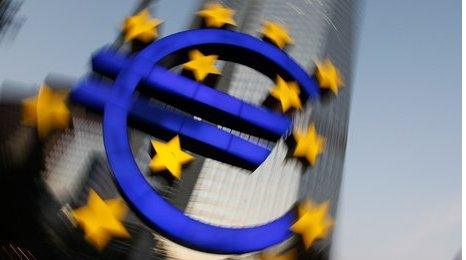
- Published10 August 2011
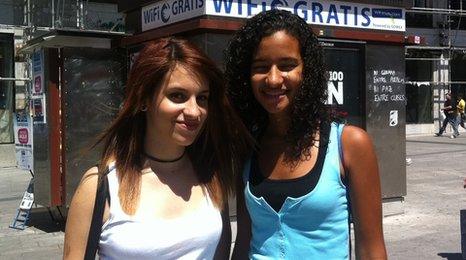
- Published27 November 2012
